I suppose you have been following at least some of the debates about the merits of the story and the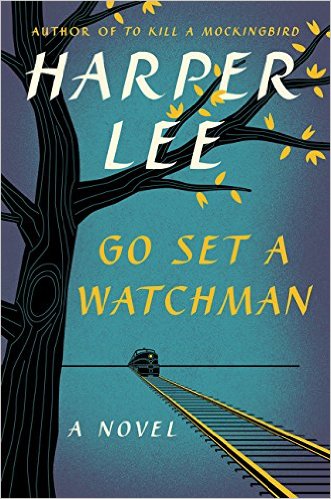 ethics of the release of Go Set a Watchman. We hope you know we sell it at 25% off. I weighed in a bit about the controversy at Facebook, and linked to a spectacular essay by Mako Fujimuro, which shows both his deeply Christian aesthetic thoughtfulness, and his wide literary fluency. (He links the two Harper Lee novels to two Blake poems!)
ethics of the release of Go Set a Watchman. We hope you know we sell it at 25% off. I weighed in a bit about the controversy at Facebook, and linked to a spectacular essay by Mako Fujimuro, which shows both his deeply Christian aesthetic thoughtfulness, and his wide literary fluency. (He links the two Harper Lee novels to two Blake poems!)
If it is true that Ms Lee did not give full, knowing consent to the publication of this early work of hers, that is a gross injustice, although the publisher (HarperCollins) maintains that agreements and contracts were made with fully proper procedure. Are they lying? I don’t know.
Whether you want to read this earlier story – Scout is much older, and sees the racial attitudes of her beloved father Atticus Finch through more adult, and perhaps more jaded eyes – is, obviously, up to you; obviously. But I have found it a bit odd how vociferous some have been about it. One Christian leader called it “trash” and hundreds have sworn that no revision of Saint Atticus could ever, ever be considered. Some are terribly fearful that Lee’s earlier story, if they read it, would ruin their love of To Kill a Mockingbird. Well, then.
 Here are some other novels you might want to enjoy, books that somehow might share somewhat of a tone or style or setting. I have heard such good things about Go Set a Watchman that it is on my stack to be read soon. (Beth and I both read To Kill a Mockingbird – for the first time! – just a week ago, and I’m still stunned by its beauty and goodness and the joy of being immersed in this funny, tragic, curious community in the deep South. I want to read more about these characters, even if it is somewhat lesser literature or a perplexing story.) But I can appreciate that some just aren’t interested.
Here are some other novels you might want to enjoy, books that somehow might share somewhat of a tone or style or setting. I have heard such good things about Go Set a Watchman that it is on my stack to be read soon. (Beth and I both read To Kill a Mockingbird – for the first time! – just a week ago, and I’m still stunned by its beauty and goodness and the joy of being immersed in this funny, tragic, curious community in the deep South. I want to read more about these characters, even if it is somewhat lesser literature or a perplexing story.) But I can appreciate that some just aren’t interested.
I am not suggesting that these on this list resemble either of Harper Lee’s memorably works. I am really not suggesting they be read instead of hers, or alongside them, even. They just sort of sprung to mind as I browsed our own fiction section wondering what else we might offer to those who aren’t sold on Go Set... So, just for fun, here are some titles that at least capture the slow cadence, the good writing, the sense of place, and the ethical vision of the best of mid-twentieth-century Southern fiction. And this doesn’t even include any classics by those who were more or less contemporaries of Ms Lee, such as Walker Percy, Zora Neale Hurston, Robert Penn Warren, Steinbeck, Faulkner.
AND THESE TOO… By the way, I really enjoy very contemporary stuff, with that ironic tone, the screwy (post?) modern style, the anguished, religiously haunted world. Jonathan Franzen, naturally. Jeffery Eugenides has provided hours of delight (both the amazing, epic Middlesex and The Marriage Plot, about recently graduated college students, their romance and writing projects.) I truly loved The Art of Fielding (also about college life, as well as baseball and Melville) and the much-discussed To Rise Again at a Decent Hour by Joshua Ferris (a crazy book about a sullen dentist and an oddball religious cult chasing him down with made up Bible verses.) I whizzed through the last two David Eggers because I could, and was moved by the writing and plots of Oprah recommended Wally Lamb (The Hour I First Believed and We Are Water both really pleased my middlebrow tastes, and have much to say, although they are a bit too vulgar.) Lots of people are talking about the quirky National Book Award finalist Station 11 by Emily St. John, which is now out in paperback, and I guess I should read that, although the plot doesn’t appeal to me. I haven’t read Donna Tartt’s The Goldfinch yet, but it won the Pulitzer and I have been waiting to find time for it, once I snag a hardback from the library. And I’ve got to get to The Girl on the Train, which lots of people have recommended. And I swear I’m going to read Life of Pi again one of these days.
And, although it is not zippy or contemporary, the best novel I have read all year is doubtlessly the exquisite All the Light We Cannot See by Anthony Doerr (Scribner; $27.00.) It is big and glorious and profound, set during World War II in Paris and Germany. Truly unforgettable and very highly recommended.
These books that follow are decidedly not like those.
Again, I am not saying they are like Harper Lee (who is?) but I thought of them while reading comments by those who said they didn’t want to read Go Set a Watchman or by those who did, and are now in a mood for more slow, kind, thoughtful Americana or other beautifully rendered important stories. Maybe you could take these on an upcoming vacation or weekend camping trip. Or take a chair out back, after supper. I think any of these would be well worth your investment; I am familiar with each, but have myself not read them all. (Don’t I wish!) We would love to fill your order, if you are so inclined. You can let us know what you think.
TEN BOOKS. TWENTY PERCENT OFF.
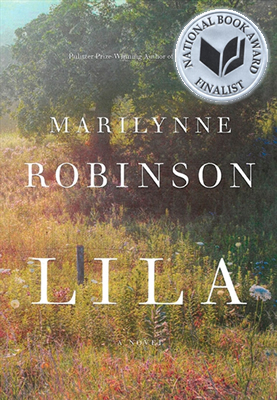 Lila Marilynne Robinson (FSG) $26.00 Ms Robinson is certainly one of the most honored and prestigious writers of our time. Her Gilead is a must read – a Pulitzer Prize winning story of an older Protestant clergyman telling his story. (“So serenely beautiful, and written in a prose so gravely measured and thoughtful, that one feels touched with grace just to read it,” said the Washington Post reviewer.) Home is the sequel, telling the story of another pastor, the friend of John Ames in Gilead. (“An anguished pastoral, a tableau of decency and compassion that is also an angry and devastating indictment of moral cowardice and unrepentant, unacknowledged sin… Beautiful.” (You can see why I list it now, in this conversation of Harper Lee and Atticus Finch and the like.) Lila is the most recent, still only in hardcover, and we’ve promoted it here in the shop, on line, and at church gatherings. (Critic Pat MacEnulty of The Charlotte Observer notes that “When Marilynne Robinson writes a new book, it’s an event.”) In this poignant, quiet, moving tale we learn about Lila, who appears in Gilead as the rather mysterious wife of Pastor John Ames. She is from a hard background (that much we know) and her difficult, brave, curious life comes to us in full color in this third book set in Gilead, Iowa. It was promised to be “a moving expression of the mysteries of existence” and “destined to become an American classic.” We invite you to order it from us, and we trust you will be blessed with hours of important, enjoyable reading. If you haven’t read Giliad, or even Home, you don’t have to read those first, but I suppose you should.
Lila Marilynne Robinson (FSG) $26.00 Ms Robinson is certainly one of the most honored and prestigious writers of our time. Her Gilead is a must read – a Pulitzer Prize winning story of an older Protestant clergyman telling his story. (“So serenely beautiful, and written in a prose so gravely measured and thoughtful, that one feels touched with grace just to read it,” said the Washington Post reviewer.) Home is the sequel, telling the story of another pastor, the friend of John Ames in Gilead. (“An anguished pastoral, a tableau of decency and compassion that is also an angry and devastating indictment of moral cowardice and unrepentant, unacknowledged sin… Beautiful.” (You can see why I list it now, in this conversation of Harper Lee and Atticus Finch and the like.) Lila is the most recent, still only in hardcover, and we’ve promoted it here in the shop, on line, and at church gatherings. (Critic Pat MacEnulty of The Charlotte Observer notes that “When Marilynne Robinson writes a new book, it’s an event.”) In this poignant, quiet, moving tale we learn about Lila, who appears in Gilead as the rather mysterious wife of Pastor John Ames. She is from a hard background (that much we know) and her difficult, brave, curious life comes to us in full color in this third book set in Gilead, Iowa. It was promised to be “a moving expression of the mysteries of existence” and “destined to become an American classic.” We invite you to order it from us, and we trust you will be blessed with hours of important, enjoyable reading. If you haven’t read Giliad, or even Home, you don’t have to read those first, but I suppose you should.
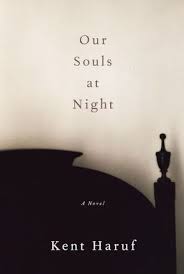 Our Souls at Night Kent Haruf (Knopf) $24.00 Not too many books these days come with a major endorsement on the back from Ursula K. Le Guin, but her rave review is sumptuous. (She calls him “stunningly original” and suggests that “He talks quietly, intimately, yet with reserve, as one adult to another. He’s careful to get the story right. And it is right, it’s just right; it rings true.” Not bad, given that he talks about all manner of moral questions, perhaps even (in Le Guin’s assessment) “an unspoken mysticism.” When a writer of her caliber says some of his writing and topics are “unsurpassed by anything I know in contemporary fiction” you have to notice.
Our Souls at Night Kent Haruf (Knopf) $24.00 Not too many books these days come with a major endorsement on the back from Ursula K. Le Guin, but her rave review is sumptuous. (She calls him “stunningly original” and suggests that “He talks quietly, intimately, yet with reserve, as one adult to another. He’s careful to get the story right. And it is right, it’s just right; it rings true.” Not bad, given that he talks about all manner of moral questions, perhaps even (in Le Guin’s assessment) “an unspoken mysticism.” When a writer of her caliber says some of his writing and topics are “unsurpassed by anything I know in contemporary fiction” you have to notice.
We discovered his first book set in Colorado, Plainsong, probably from Eugene Peterson who commended it years ago. (And the sequels, Eventide and Benediction whose very titles might rightly draw our attention to something important going on.) A dear local pastor who reads widely suggested these others, too, and we’ve been pleased to stock them ever since. We are glad to have this new, small one, published posthumously. (Haruf died at age 71 in 2014.) Our Souls at Night is said to be “a spare yet eloquent, bittersweet yet inspiring story of a man and a woman who, in advanced age, come together to wrestle with the events of their lives and their hopes for the imminent future.” Set in Holt, Colorado (home to all of Haruf’s inimitable fiction” it involves one Addie Moore and Louis Waters, widow and widower, and the pleasures and adventures of their old age set in this rugged landscape.
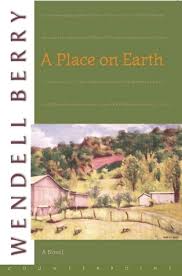 A Place on Earth Wendell Berry (Counterpoint) $16.95 I assume most of our BookNotes readers know of our affection for Wendell Berry (his important essays as well as his fiction and poetry.) Jayber Crow and Hannah Coulter are by far his most popular novels, although I often exclaim about The Memory of Old Jack, which I adored and introduced me to the wonders of the Port Williams membership. I name this one, now, since one of the things that attract us to works like To Kill a Mockingbird is the developed sense of place — especially that of a small town set in a rural region. What sets A Place on Earth apart as a must-read for Berry fans is that “the central character is not a person but a place: Port Williams, Kentucky, the farm lands and forests that surround it and the Kentucky River that runs nearby. This is a region that Wendell Berry knows intimately, with both heart and mind, a region whose faults and virtues he has spent a lifetime learning.” Berry’s first novel, by the way, came out in 1960, I believe, the same year as Mockingbird.
A Place on Earth Wendell Berry (Counterpoint) $16.95 I assume most of our BookNotes readers know of our affection for Wendell Berry (his important essays as well as his fiction and poetry.) Jayber Crow and Hannah Coulter are by far his most popular novels, although I often exclaim about The Memory of Old Jack, which I adored and introduced me to the wonders of the Port Williams membership. I name this one, now, since one of the things that attract us to works like To Kill a Mockingbird is the developed sense of place — especially that of a small town set in a rural region. What sets A Place on Earth apart as a must-read for Berry fans is that “the central character is not a person but a place: Port Williams, Kentucky, the farm lands and forests that surround it and the Kentucky River that runs nearby. This is a region that Wendell Berry knows intimately, with both heart and mind, a region whose faults and virtues he has spent a lifetime learning.” Berry’s first novel, by the way, came out in 1960, I believe, the same year as Mockingbird.
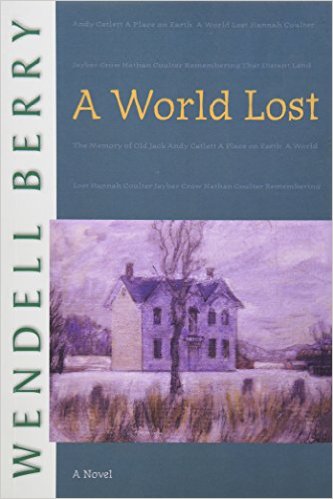 A World Lost Wendell Berry (Counterpoint) $13.95 This is a short novel, opening in 1944 with nine-year-old Andy Catlett enjoying a blissful summer on his grandparents farm near Port William. A brawl ensues, and Andy’s uncle is murdered, a tragedy that Andy looks back upon years later wonders if he could have prevented. I name this because many feel this is an overlooked classic of Mr. Berry’s (I have not read it yet) but also because of how this theme may resonate with those pondering the adult character Jean Louise (Scout) in Go Set a Watchman and her own looking back upon her complex father, Atticus Finch. Publisher’s Weekly says of A World Lost “Berry shows us the psychic costs of misplaced family pride and social rigidity, and yet he also celebrates the benevolent blessing of familial love. This is simple, soul-satisfying storytelling, augmented by understated humor and quiet insight.” It was his fifth novel, was later expanded and re-issued, and is (as it says on the back) “a moving tale about the power of memory and lost time.” Yes, this would be perfect to read right about now.
A World Lost Wendell Berry (Counterpoint) $13.95 This is a short novel, opening in 1944 with nine-year-old Andy Catlett enjoying a blissful summer on his grandparents farm near Port William. A brawl ensues, and Andy’s uncle is murdered, a tragedy that Andy looks back upon years later wonders if he could have prevented. I name this because many feel this is an overlooked classic of Mr. Berry’s (I have not read it yet) but also because of how this theme may resonate with those pondering the adult character Jean Louise (Scout) in Go Set a Watchman and her own looking back upon her complex father, Atticus Finch. Publisher’s Weekly says of A World Lost “Berry shows us the psychic costs of misplaced family pride and social rigidity, and yet he also celebrates the benevolent blessing of familial love. This is simple, soul-satisfying storytelling, augmented by understated humor and quiet insight.” It was his fifth novel, was later expanded and re-issued, and is (as it says on the back) “a moving tale about the power of memory and lost time.” Yes, this would be perfect to read right about now.
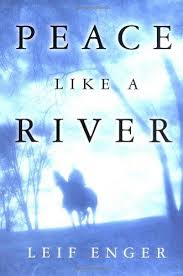 Peace Like a River Leif Enger (Grove Press) $16.00 Last summer I wrote a long list of books out postmodern apologetics, gentle evangelism, and storytelling as a key to understanding (and reaching with the gospel) the contemporary generations. We had sponsored James K.A. Smith to lecture on his book explaining the philosophy of Charles Taylor —How (Not) To Be Secular: Reading Charles Taylor – and noted how Jamie underscored Taylor’s call to use fiction in our conversations about cultural engagement. I am not the first to note that much contemporary fiction is far from “secular” and that some of the best New York Times bestsellers are, in fact, profoundly spiritual. Lief Enger’s beloved story is nearly a case study in such very contemporary religiously-shaped contemporary fiction. It received tons of great reviews –Newsday’s reviewer, Dan Cryer, says, “What allows Peace Like a River to transcend any limitations of belief and genre is its broad, sagacious humanity… There is magic here, none more potent than Enger’s prose.” The Denver Post review said “Once in a great while, a book comes along that has such wonderful characters and marvelous prose, that you read it as much for the pure joy it offers on every pages as to find out how it ends.” This is a book about ordinary life, but since it may lapse into “magical realism” — the boy who is the main character has reason to believe in miracles – it isn’t really like Harper Lee or Wendell Berry. But it is set in the mid-West, there is the huge question of whether love can overcome tragedy, and there is a (trumped up?) murder charge haunting an outlaw brother. And there is this question of miracles… Peace Like a River is a fine, fine book, sure to please, one you will never forget. Early reviews when it came out in 2001 started with superlatives – stunning, big-hearted, beautiful, dazzling, dangerous, compelling, “exceptionally heart-felt.” We would be delighted to have you order it from us. Or maybe just get two, since you are surely going to want to share it.
Peace Like a River Leif Enger (Grove Press) $16.00 Last summer I wrote a long list of books out postmodern apologetics, gentle evangelism, and storytelling as a key to understanding (and reaching with the gospel) the contemporary generations. We had sponsored James K.A. Smith to lecture on his book explaining the philosophy of Charles Taylor —How (Not) To Be Secular: Reading Charles Taylor – and noted how Jamie underscored Taylor’s call to use fiction in our conversations about cultural engagement. I am not the first to note that much contemporary fiction is far from “secular” and that some of the best New York Times bestsellers are, in fact, profoundly spiritual. Lief Enger’s beloved story is nearly a case study in such very contemporary religiously-shaped contemporary fiction. It received tons of great reviews –Newsday’s reviewer, Dan Cryer, says, “What allows Peace Like a River to transcend any limitations of belief and genre is its broad, sagacious humanity… There is magic here, none more potent than Enger’s prose.” The Denver Post review said “Once in a great while, a book comes along that has such wonderful characters and marvelous prose, that you read it as much for the pure joy it offers on every pages as to find out how it ends.” This is a book about ordinary life, but since it may lapse into “magical realism” — the boy who is the main character has reason to believe in miracles – it isn’t really like Harper Lee or Wendell Berry. But it is set in the mid-West, there is the huge question of whether love can overcome tragedy, and there is a (trumped up?) murder charge haunting an outlaw brother. And there is this question of miracles… Peace Like a River is a fine, fine book, sure to please, one you will never forget. Early reviews when it came out in 2001 started with superlatives – stunning, big-hearted, beautiful, dazzling, dangerous, compelling, “exceptionally heart-felt.” We would be delighted to have you order it from us. Or maybe just get two, since you are surely going to want to share it.
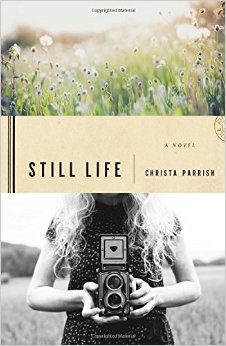 Still Life: A Novel Christa Parrish (Nelson) $15.99 Decades ago there developed this sub-genre of “Christian fiction” by which most folks mean evangelical Christian writers penning somewhat inspirational stories, published by publishers aligned with the “Christian Booksellers Association.” These have been very popular, and roundly mocked, often for bad writing, bad covers, and shallow theology. Many are historical fiction, most are romances, and, of course, we know that many are now Amish-themed. (We have hosted one of the better writers of Amish stories, Beverly Lewis, here at the shop more than once.) Well, think what you may about the reputation of “Christian fiction” the old stereotypes are less warranted these days, and there are some very nice novels by very gift writers, whose faith colors their stories in subtle and interesting ways. Christina Parrish seems to be one of these kinds of writers (her Stones for Bread struck me first for the nice cover and some good reviews by sources I respect.) In this new one, the main character, Ada, we learn, we born into a fringe religious sect led by her father. Her lifelong habit of absolute obedience “was shattered when she fled the family compound to elope with photographer Julian Goetz.” There is another character – Katherine Walker, whose marriage is loveless. Tragic loss conspires to bring them together and they then come into relationship with an artistic young boy. Still Life is a fairly complex work that explores toxic faith, merciful escape, and supernatural love. There is a included a reading group guide as the publishers hope that book clubs, small Bible study groups, especially women’s fellowship groups might enjoy talking about it together.
Still Life: A Novel Christa Parrish (Nelson) $15.99 Decades ago there developed this sub-genre of “Christian fiction” by which most folks mean evangelical Christian writers penning somewhat inspirational stories, published by publishers aligned with the “Christian Booksellers Association.” These have been very popular, and roundly mocked, often for bad writing, bad covers, and shallow theology. Many are historical fiction, most are romances, and, of course, we know that many are now Amish-themed. (We have hosted one of the better writers of Amish stories, Beverly Lewis, here at the shop more than once.) Well, think what you may about the reputation of “Christian fiction” the old stereotypes are less warranted these days, and there are some very nice novels by very gift writers, whose faith colors their stories in subtle and interesting ways. Christina Parrish seems to be one of these kinds of writers (her Stones for Bread struck me first for the nice cover and some good reviews by sources I respect.) In this new one, the main character, Ada, we learn, we born into a fringe religious sect led by her father. Her lifelong habit of absolute obedience “was shattered when she fled the family compound to elope with photographer Julian Goetz.” There is another character – Katherine Walker, whose marriage is loveless. Tragic loss conspires to bring them together and they then come into relationship with an artistic young boy. Still Life is a fairly complex work that explores toxic faith, merciful escape, and supernatural love. There is a included a reading group guide as the publishers hope that book clubs, small Bible study groups, especially women’s fellowship groups might enjoy talking about it together.
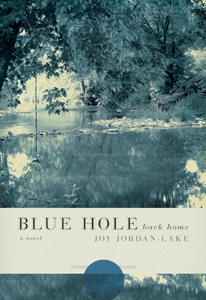 Blue Hole Back Home Joy Jordan-Lake (Cook) $13.99 This is another wonderful example of a profoundly Christian writer, doing an excellent novel on a CBA/evangelical publishing house. Joy Jordan-Lake is an accomplished non-fiction writer, and we’ve commended her fine stuff before. Besides her Masters degree from a seminary, she has a PhD in nineteenth-century American literature – which has obviously prepared her for thinking well about the nature of serious fiction. But who knew she could pen such an interesting story? Listen to this: Brett Lott, himself an acclaimed mainstream novelist says Jordon-Lake “has written a fine tale of racial conflict and healing, and done so with a fresh and engaging voice.” Or, better — and spot on for our purposes here – listen to the amazing publishing guru herself, The Ms. Phyllis Tickle: “Reminiscent of To Kill a Mockingbird, Blue Hole Back Home is a haunting story, lyrically told, about the death of innocence under a Southern sun.”
Blue Hole Back Home Joy Jordan-Lake (Cook) $13.99 This is another wonderful example of a profoundly Christian writer, doing an excellent novel on a CBA/evangelical publishing house. Joy Jordan-Lake is an accomplished non-fiction writer, and we’ve commended her fine stuff before. Besides her Masters degree from a seminary, she has a PhD in nineteenth-century American literature – which has obviously prepared her for thinking well about the nature of serious fiction. But who knew she could pen such an interesting story? Listen to this: Brett Lott, himself an acclaimed mainstream novelist says Jordon-Lake “has written a fine tale of racial conflict and healing, and done so with a fresh and engaging voice.” Or, better — and spot on for our purposes here – listen to the amazing publishing guru herself, The Ms. Phyllis Tickle: “Reminiscent of To Kill a Mockingbird, Blue Hole Back Home is a haunting story, lyrically told, about the death of innocence under a Southern sun.”
Set among a mangy pack of kids in 1979, the summer was “heavy not only with the humid Appalachian air, but also with the raw emotion brought on by a stranger in their midst. The new girl. The new girl with the deeply colored skin and the straight shiny hair and the father who prayed on a rug facing east each morning.”
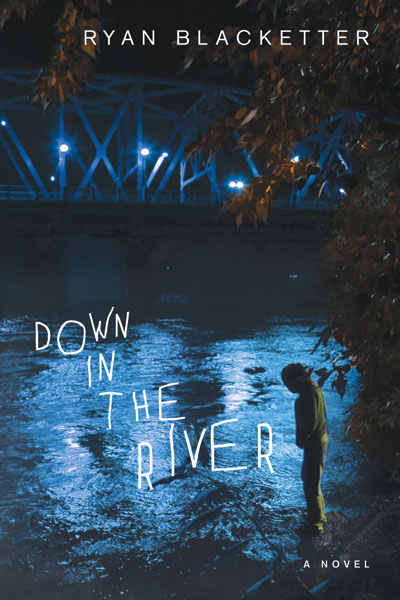 Down in the River Ryan Blacketter (Slant) $22.00 We have talked before, and continue to proudly stock each of the books in this important literary imprint curated by Image Journal editor Gregory Wolfe. (l loved their story involving — among other spectacular things — liberation theologians in Central America, A Land Without Sin by Paula Huston.) I have not looked at this recent one much, but it seems to be right to list it here. This is a dark, serious tale, set in the contemporary Pacific Northwest (the author is from Idaho) and resonant with important themes for those who want a moral center to their edgy fiction. It is about grief and loss, religion and resistance, a brave story claiming to be about the deepest matters of the human heart. Listen to these rave reviews, first from Marilynne Robinson (yes, Marilynne Robinson!): “Blacketter has a marvelous eye for the emotional textures of the most commonplace experience, the kind that familiarity makes almost subliminal.”
Down in the River Ryan Blacketter (Slant) $22.00 We have talked before, and continue to proudly stock each of the books in this important literary imprint curated by Image Journal editor Gregory Wolfe. (l loved their story involving — among other spectacular things — liberation theologians in Central America, A Land Without Sin by Paula Huston.) I have not looked at this recent one much, but it seems to be right to list it here. This is a dark, serious tale, set in the contemporary Pacific Northwest (the author is from Idaho) and resonant with important themes for those who want a moral center to their edgy fiction. It is about grief and loss, religion and resistance, a brave story claiming to be about the deepest matters of the human heart. Listen to these rave reviews, first from Marilynne Robinson (yes, Marilynne Robinson!): “Blacketter has a marvelous eye for the emotional textures of the most commonplace experience, the kind that familiarity makes almost subliminal.”
Shann Ray (author of American Masculine) says,
Blacketter’s prose is paired with the torque of a plot that lives and moves like an indomitable engine. This difficult and necessary story is inbreathed with a ferocity that leaves the reader shaken. In the end, through Blacketter’s sure hand, we encounter a surprisingly intimate brush with our own desire for peace of soul, and in so doing, are drawn toward the ineffable mystery of how our contact with others inevitably carries with it a sense of infinity gravity.
Or, as another reviewer, Pinckney Benedit (Miracle Boy and Other Stories) tell us,
I can’t remember when I’ve liked a character as much as I like young Lyle Rettew, or when I’ve cheered one on so hard despite the fact that he’s clearly crazy and his quest is doomed. A thunderous debut, and the beginning of what will surely be a breathtaking career.
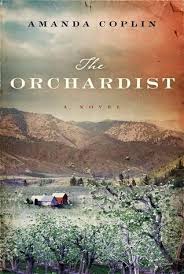 The Orchardist Amanda Coplin (Harper Perennial) $15.99 Here is another book set in the Pacific Northwest, one which is known for “exquisitely described landscapes.” (A review at O called it “a wise and great American novel” and Entertainment Weekly review said “There are echoes of John Steinbeck in this beautiful and haunting debut.”) Set in the early 20th century, it is said to be both somber and majestic, and written with “dazzling craftsmanship.” The story’s main character carefully stewards his fruit orchards, shows compassion to some young runaway (and very pregnant) women, and is led to the depth of soul-searching as he struggles to reconcile with his own past, and protect these teens. I read in an interview how it took the author eight years to finish the manuscript, but despite all the permutations it went through, her vision remained true, and the characters strong. I don’t know why, but I wanted to share this one, here, now, for those still pondering the Harper Lee matter. NPR said it was “A stunning accomplishment, hypnotic in its storytelling power, by turns lyrical and gritty, and filled with marvels.” It has a nice paperback cover with deckled edges, surely a lovely book to have.
The Orchardist Amanda Coplin (Harper Perennial) $15.99 Here is another book set in the Pacific Northwest, one which is known for “exquisitely described landscapes.” (A review at O called it “a wise and great American novel” and Entertainment Weekly review said “There are echoes of John Steinbeck in this beautiful and haunting debut.”) Set in the early 20th century, it is said to be both somber and majestic, and written with “dazzling craftsmanship.” The story’s main character carefully stewards his fruit orchards, shows compassion to some young runaway (and very pregnant) women, and is led to the depth of soul-searching as he struggles to reconcile with his own past, and protect these teens. I read in an interview how it took the author eight years to finish the manuscript, but despite all the permutations it went through, her vision remained true, and the characters strong. I don’t know why, but I wanted to share this one, here, now, for those still pondering the Harper Lee matter. NPR said it was “A stunning accomplishment, hypnotic in its storytelling power, by turns lyrical and gritty, and filled with marvels.” It has a nice paperback cover with deckled edges, surely a lovely book to have.
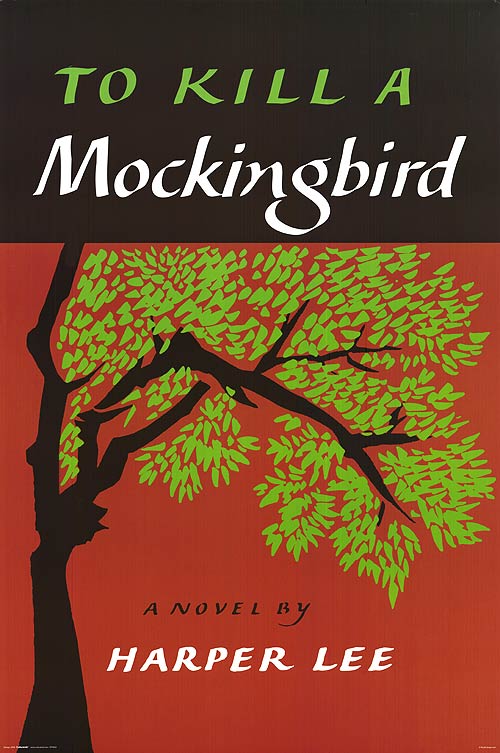 To Kill a Mockingbird Harper Lee (Harper Perennial) $14.95 That’s only nine titles I’ve listed, you say? Well, how about revisiting To Kill a Mockingbird? We’ve got a lovely paperback edition, and, really, if you haven’t read it, or haven’t read it as an adult, well… There’s no need to say much. It is a truly great American classic, and once you get in to the cadence and language of the kids — Scout and her older brother, Jem — you’ll have a blast and not want to leave their intriguing, playful, wonder-filled and at times scary Southern world. And, just so you know, we have a few of the very interesting books about this classic, such as The Mockingbird Parables: Transforming Lives Through the Power of Story by Matt Litten (Nelson; $14.99.) To commemorate the 50th anniversary of the release of the book a few years ago
To Kill a Mockingbird Harper Lee (Harper Perennial) $14.95 That’s only nine titles I’ve listed, you say? Well, how about revisiting To Kill a Mockingbird? We’ve got a lovely paperback edition, and, really, if you haven’t read it, or haven’t read it as an adult, well… There’s no need to say much. It is a truly great American classic, and once you get in to the cadence and language of the kids — Scout and her older brother, Jem — you’ll have a blast and not want to leave their intriguing, playful, wonder-filled and at times scary Southern world. And, just so you know, we have a few of the very interesting books about this classic, such as The Mockingbird Parables: Transforming Lives Through the Power of Story by Matt Litten (Nelson; $14.99.) To commemorate the 50th anniversary of the release of the book a few years ago
filmmaker Mary Murphy has interviewed dozens of prominent figures on how the book has impacted their
lives. It’s a great reminder of the power of this story. These interviews are compiled in Scout, Atticus, and Boo (Harper Perennial; $14.99) with a foreword from acclaimed writer Wally Lamb. Nice. And of course, there is the much-acclaimed I Am Scout: The Biography of Harper Lee by Charles Shields. Lots of great titles to keep us in that liminal Alabama space.
BookNotes
DISCOUNT
ANY ITEM MENTIONED
20% off
order here
takes you to the secure Hearts & Minds order form page
just tell us what you want
inquire here
if you have questions or need more information
just ask us what you want to know
Hearts & Minds 234 East Main Street Dallastown, PA 17313 717-246-333
